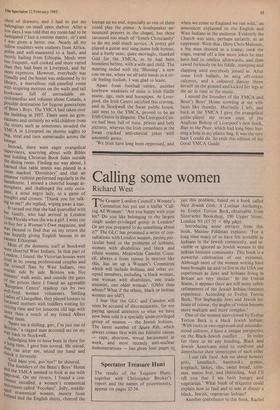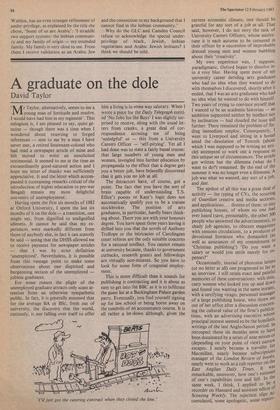Calling some women
Richard West
The Greater £.ondon Council's Women's Committee has put out a leaflet 'Call- ing All Women': 'Are you happy with your lot? Do you like belonging to the largest single under-privileged group in London? Or are you prepared to do something about it?' The GLC has promised a series of con- sultations with London women, paying par- ticular heed to the problems of lesbians, women with disabilities and black and ethnic women. Meanwhile Camden Coun- cil, always a front runner in matters like this, has set up a Women's Committee which will include lesbians and other co- opted members, including 'a black woman, one woman with disabilities, one trade unionist, one older woman'. (Older than whom? What if the ethnic, black or lesbian women are old?) I fear that the GLC and Camden will soon be accused of discrimination, for not paying special attention to what we have now been told is a specially underprivileged group of women — the Jewish lesbians. The latest number of Spare Rib, which always comes first with the feminist causes — rape, abortion, sexual harassment at work, and most recently anti-nuclear demonstrations — has given four pages to.
just this problem, based on a book called Nice Jewish Girls: A Lesbian Anthology, by Evelyn Torton Beck, obtainable from Sisterwrite Bookshop, 190 Upper Street, London N1 (£5.35 + 60p p&p).
Introducing some extracts from this book, Maxine Feldman explains: 'For a long time many of us have felt invisible as lesbians in the Jewish community,' and in- visible or ignored as Jewish women in the lesbian feminist community. This book is a powerful celebration of our existence. Although most of the women writing have been brought up and/or live in the USA our experiences as Jews and lesbians living in Britain are very similar.' In the United States, it appears there are still more subtle refinements of the Jewish lesbian/feminist experience. According to Evelyn Torton Beck: 'For Sephardic Jews and Jewish les- bians of colour, the angles of vision become more multiple and more complex.'
One of the women interviewed by Evelyn Torton Beck is a black Jewish lesbian: `With roots in two oppressed and misunder- stood cultures, I have a unique perspective on the Black-Jewish conflict ... In order• for there to be any bonding, Black and Jewish Americans need to confront and demythicise their stereotypes of each other ... I can talk food. Ask me about hominy grits, knaidlach, hamhocks, greens, kreplach, latkes, ribs, sweet bread, tzim- mes, matzo brei, and chitterling. And I'll tell you that I am both hungry and vegetarian.' What book of etiquette could explain how to feed and to seat at dinner a black, Jewish, vegetarian lesbian?
Another contributor to this book, Rachel Wahlon, has an even stranger refinement of under-privilege, as explained by the title she chose, 'Some of us are Arabic': 'I straddle two support systems: the lesbian communi- ty and my family of origin — my extended family. My family is very close to me. From them I receive validation as an Arabic Jew and the connection to my background that I cannot find in the lesbian community.'
Why do the GLC and Camden Council refuse to acknowledge the special under- privilege of black, Jewish, lesbian vegetarians and Arabic Jewish lesbians? I think we should be told.







































 Previous page
Previous page